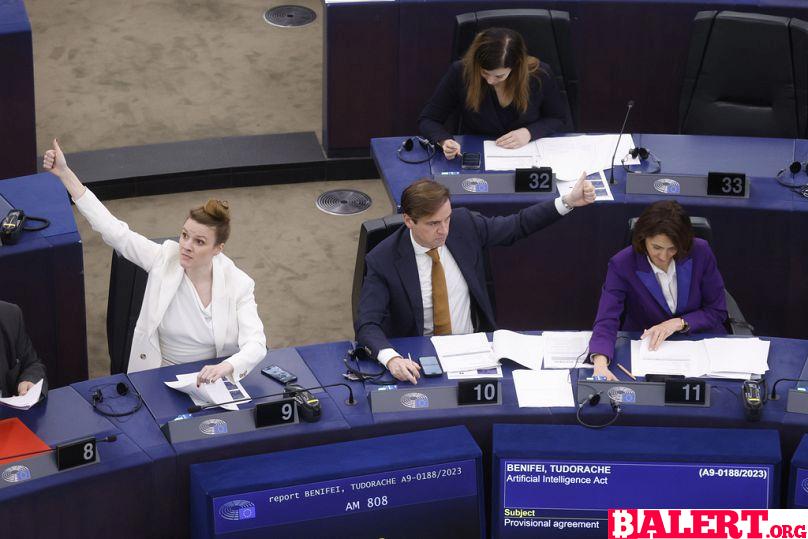World
The Impact of European Elections on Digital Rights and Technosolutionism
Explore how the European elections shape digital rights and influence technosolutionism. Discover the implications for privacy, data protection, and the future of technology governance in Europe.

The Impact of the Recent European Elections on Digital Rights

The European elections held in June have left many of us in civil society reeling, underscoring the alarming rise of far-right ideologies within our democratic institutions. With over two decades of experience advocating for a free, fair, and open digital environment across Europe, it is evident that this shift poses a severe threat to our fundamental rights. As we look forward to the upcoming mandate of EU institutions, we brace for an increase in the market dominance of large tech corporations and a potential escalation in oppressive state surveillance practices.
Much of the discourse surrounding these elections has centered on the ways technology could help tackle intricate sociopolitical challenges, including climate change, job insecurity, and the militarization of public spaces. This narrative is not a novel one. As the leader of the largest network of digital rights organizations in Europe, I have witnessed how technology is frequently sold to European institutions as a cure-all for our societal dilemmas.
However, the reality is far more nuanced. Technology is not the panacea it is often portrayed to be; in many cases, it can exacerbate existing issues. While technology is heralded as the quickest path to profit and growth, its social and environmental repercussions often go unacknowledged. Instead, we require holistic and intersectional solutions to our most pressing challenges—solutions that prioritize people’s needs for safety, well-being, and health rather than mere quick fixes.
False Technosolutionist Narratives at the Cost of Our Rights
As the preeminent advocate for digital rights in Europe, the EDRi network has diligently monitored the actions of the last EU mandate. Our experiences reveal that the prevailing technosolutionist narrative within EU institutions—largely shaped by rampant corporate lobbying—has dire consequences for our dignity, our rights, and the integrity of our elections, not to mention the health of our planet.
Throughout the last mandate, we witnessed repeated efforts by EU institutions to promote a false sense of “security” that undermines our fundamental rights. In the wake of the European elections, the newly formed conservative majority in the European Parliament is poised to champion defense technology, particularly concerning immigration and border control.
This was starkly evident in the political push for age verification measures, which jeopardize encryption and facilitate mass surveillance of our digital lives. Intrusive technologies such as spyware and biometric surveillance have been misleadingly touted as the only viable solutions to protect children or combat crime. Such technologies have damaging effects on our ability to communicate securely online, access vital information, explore our identities, and organize politically. The groups disproportionately affected include journalists, human rights defenders, young people, and marginalized communities.
Related
- Are we about to lose the last pillar of our digital security?
- When law enforcement undermines our digital safety, who is looking after our interests?
The conservative majority in the European Parliament is expected to prioritize defense technology, especially concerning immigration and border control. This trend is indicative of a broader pattern of neglecting the rights of migrants and racialized individuals, which poses significant threats to the health of our democratic societies as a whole.
False Securitization Will Lead Us Nowhere
The landmark AI Act, adopted by the EU in April 2024, exemplifies the troubling use of security narratives at the expense of our fundamental rights. This legislation designates anything related to “national security” as a digital rights-free zone, with scant accountability for institutions and actors employing high-risk systems in policing. These shortcomings in the AI Act stem from the collaboration of tech corporations, start-ups, and EU member states, all lobbying for diluted legislation to safeguard their profits and inflated national security agendas.
As we navigate the aftermath of the elections, the implementation of the AI Act will proceed. Progressive lawmakers must rise to defend the humanity and dignity of migrants, especially as louder voices advocate for an intensified “fortress Europe.” Concurrently, EU institutions are promoting the “twinning of green and digital transitions,” suggesting that tech solutions are the answer to the climate crisis. This narrative serves the business interests of tech companies, which thrive when we limit our approach to a complex environmental crisis to mere technological fixes.
Related
- Can the EU AI Act embrace people’s needs while redefining algorithms?
- EU AI Act reaction: Tech experts say the world’s first AI law is ‘historic’ but ‘bittersweet’
Through our collaborations with digital rights and climate justice organizations, we have observed repeatedly how AI and digital tech corporations engage in practices reliant on extractivism, significant water and energy consumption, and the generation of toxic waste. It is glaringly evident that these technosolutionist and false securitization narratives do not lead us toward a future where everyone can thrive.

What Must Change for a Future Where We All Thrive?
Nonetheless, the recent elections presented a silver lining—a chance to redirect public discourse toward a vision of a more just, equitable, and sustainable digital future. To move away from a technosolutionist mindset, we must envision a future where technology serves humanity, democracy, and the planet. This requires us to critically examine how technology perpetuates harmful power dynamics within our society.
Collectively, we can construct a world where our digital lives are informed by care, justice, and empowerment rather than driven by profit motives, surveillance, and relentless consumption. Achieving this vision necessitates bold, systemic, and holistic approaches from European decision-makers, employing an intersectional lens that transcends existing silos.
Claire Fernandez is the Executive Director of the European Digital Rights network (EDRi).
At Euronews, we believe all perspectives matter. Contact us at view@euronews.com to send pitches or submissions and engage in the conversation.
World
Dominique Pelicot Testifies in Harrowing Rape Trial
Join us as Dominique Pelicot courageously testifies in a harrowing rape trial, shedding light on the complexities of trauma and justice. Her powerful story raises crucial questions about the legal system and the importance of support for survivors.

Dominique Pelicot Takes the Stand in Shocking Rape Trial
In a courtroom drama that has captivated France and garnered international attention, Dominique Pelicot, the man at the center of a harrowing rape trial, finally addressed the court. With tears streaming down his face, he recounted how his wife had been instrumental in helping him cope with a tumultuous past marked by trauma. He revealed that he had endured a sexual assault at the tender age of nine while hospitalized, and he also witnessed a gang rape during his teenage years while working as an apprentice electrician on a construction site.
“She didn’t deserve this, I acknowledge that,” Mr. Pelicot stated, his voice barely audible as he struggled to convey his emotions. The gravity of the situation weighed heavily on him, and the courtroom fell silent, straining to catch his every word.
Now 71 years old, Mr. Pelicot faces serious allegations of drugging his wife, Gisèle Pelicot, whom he has been married to for half a century, over a span of nearly ten years. Prosecutors contend that he used drugs to render her comatose, allowing him to rape her repeatedly. Furthermore, authorities allege that he went so far as to invite numerous men into their home, facilitating a nightmarish scenario where they, too, engaged in the assault of his wife.
Overall, 51 men, including Mr. Pelicot, are on trial concurrently, primarily facing charges related to the aggravated rape of Ms. Pelicot. Among them, one individual has already pleaded guilty to similar crimes, admitting to drugging his own wife to assault her and inviting Mr. Pelicot to partake in the horrific act while she was incapacitated.
Mr. Pelicot’s unexpected testimony came after a tumultuous start to the trial. Just a week in, he was stricken with severe health issues that forced him to miss four consecutive days in court. The head judge ultimately decided to postpone proceedings, as Mr. Pelicot was diagnosed with kidney stones, a kidney infection, and prostate complications, adding yet another layer of complexity to this already harrowing case.
World
Meta Bans Russian State Media Outlets from Social Media Platforms
Explore the implications of Meta’s decision to ban Russian state media outlets from its social media platforms. Understand the impact on information dissemination and the ongoing battle against misinformation in the digital landscape.

Meta Imposes Global Ban on Russian State Media Outlets
In a significant move, Meta Platforms, Inc., the parent company of Facebook, has announced the prohibition of Russian state media outlets, including RT (Russia Today) and Rossiya Segodnya, from all its social media platforms. The decision stems from the company’s concerns regarding the deceptive strategies employed by these media organizations to execute covert influence operations across the internet.
Meta made this announcement on Monday, emphasizing that the ban will be enforced worldwide across its various platforms, such as Instagram, WhatsApp, and Threads. The rollout of this ban is expected to take place over the coming days.
Statement from Meta
A spokesperson for Meta elaborated on the decision, stating, “After careful consideration, we have expanded our ongoing enforcement actions against Russian state media outlets. As a result, Rossiya Segodnya, RT, and other affiliated entities are now banned from our applications globally due to their involvement in foreign interference activities.”
For further insights into this development, watch the video in the player above.
World
Trump Recalls Alleged Assassination Attempt While Golfing
Explore Donald Trump’s chilling recollection of an alleged assassination attempt he experienced while enjoying a round of golf. Delve into the tense moments and his reflections on safety, fame, and the unpredictability of public life.

In a recent interview on the social media platform X, Republican presidential nominee Donald Trump recounted a harrowing incident he claims to have experienced while playing golf. Trump described how, during a peaceful Sunday morning round with friends, the tranquility of the day was abruptly shattered by the sound of gunfire in the air.
“It was a beautiful day, everything was just perfect,” Trump reflected. “Then all of a sudden, we heard shots being fired—probably around four or five in total.” He went on to explain that a Secret Service agent was the first to spot the suspect, who was allegedly armed with an AK-47, a powerful assault rifle.
“The agent saw the barrel of the weapon and immediately took action, returning fire at the barrel and aiming in the direction of the bushes,” Trump detailed. “I would have loved to have sunk that last putt, but we decided it was best to leave the scene promptly.”
Trump expressed his gratitude towards the agents and a vigilant civilian who aided in tracking down the suspect, who was eventually apprehended following a high-speed chase.
Suspect Faces Multiple Federal Gun Charges
The FBI has identified the suspect as Ryan Wesley Routh, accusing him of targeting Trump during his time at the golf club in West Palm Beach, Florida. According to an FBI report, Routh had allegedly hidden among the hedges of the golf course for an astonishing 12 hours. Authorities discovered an SKS-style assault rifle, a GoPro camera, and a bag of food at the scene.
The 58-year-old Routh is now facing two serious federal gun charges. If convicted on both counts, he could face a combined maximum sentence of 20 years in prison. Notably, neither of the charges is directly related to an assassination attempt. The first charge pertains to possessing a firearm despite a prior felony conviction, which carries a potential 15-year sentence, a fine of $250,000 (€225,000), and three years of supervised release.
The second charge involves possession of a firearm with an obliterated serial number, which could result in a five-year prison term, the same financial penalties, and also three years of supervised release. As the investigation continues, additional charges could be forthcoming.
While the motive behind Routh’s actions remains unclear, his digital footprint reveals strong political affiliations, particularly concerning issues surrounding Ukraine and China. Routh consistently expressed support for Ukraine across various social media platforms, even claiming to have orchestrated a recruitment scheme for international volunteers aiming to assist Ukraine in its fight against Russia’s invasion. This behavior has been denounced by Ukrainian soldiers and members of the International Legion, who disavowed Routh’s actions and motives.
-

 Business7 months ago
Business7 months agoThe Significance of Jackson Hole: A Central Banking Tradition
-

 Tech6 months ago
Tech6 months agoNew Leaks and Features About the Samsung Galaxy S25 Ultra
-

 Article9 months ago
Article9 months agoCreative Design Applications Developed with Artificial Intelligence
-

 Business6 months ago
Business6 months agoBhutan’s Strategic Investment in Bitcoin: A New Era for the Himalayan Kingdom
-

 Business8 months ago
Business8 months agoObituary: Dan Collins
-

 World6 months ago
World6 months agoThierry Breton Resigns: Impact on European Union Leadership
-

 Gaming6 months ago
Gaming6 months agoNew Details and Trailer Released for Dead Rising Deluxe Remaster
-

 Gaming6 months ago
Gaming6 months agoNew Details for Alan Wake 2 and PlayStation 5 Pro Announcement









